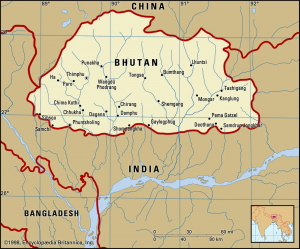Bhutan, country of south-central Asia, located on the eastern ridges of the Himalayas. Historically a remote kingdom, Bhutan became less isolated in the second half of the 20th century, and consequently the pace of change began to accelerate. With improvements in transportation, by the early 21st century a trip from the Indian border to the Bhutanese capital, Thimphu, that once took six days by mule could be made in just a few hours by car along a winding mountain road from the border town of Phuntsholing. The governmental structure also changed radically. Reforms initiated by King Jigme Dorji Wangchuk (reigned 1952–72) in the 1950s and ’60s led to a shift away from absolute monarchy in the 1990s and toward the institution of multiparty parliamentary democracy in 2008.
The economic core of Bhutan lies in the fertile valleys of the Lesser Himalayas, which are separated from one another by a series of high and complex interconnecting ridges extending across the country from north to south. The political nucleus of Bhutan is centred in the Paro and Thimphu valleys in the Lesser Himalayan region. Its location between the Assam-Bengal Plain of India to the south and the Plateau of Tibet of southwestern China to the north gives the country considerable geopolitical significance.
EARLY CHILDHOOD CARE & DEVELOPMENT (ECCD) in Bhutan
An Evaluation of the Early Childhood Care and Development Programme in Bhutan
Early Childhood Bhutan Youtube Chanel
National ECCD Impact Evaluation Study 2015
